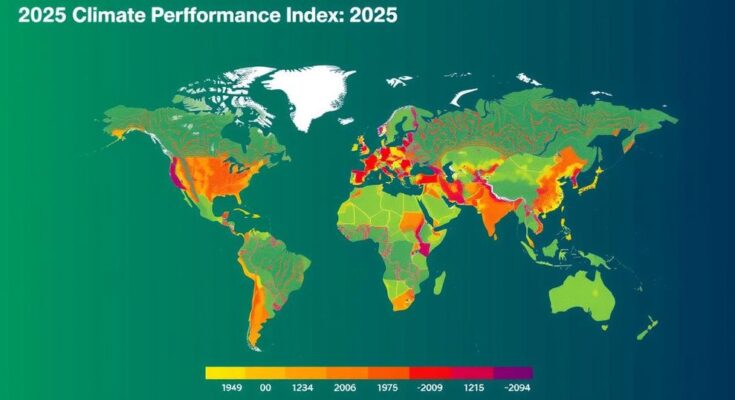The CCPI 2025 reveals a mixed global picture: while renewable energy grows swiftly in many nations, reliance on fossil fuels remains high. Denmark leads the rankings, followed by the Netherlands and the UK, yet many low performers persist, such as Argentina and fossil fuel giants like Iran and Saudi Arabia. China and the US still struggle with emissions despite some renewable growth. The EU, however, shows significant promise, with no very low performers. All nations must accelerate their climate efforts to meet international agreements.
The Climate Change Performance Index (CCPI) 2025, jointly published by Germanwatch, NewClimate Institute, and CAN International, evaluates the climate action of major global emitters responsible for 90% of emissions. Despite substantial advancements in renewable energy in most high-emission nations, many continue to rely excessively on fossil fuels, particularly natural gas. This year’s CCPI reveals that, although 61 out of 64 countries increased their renewable energy share over five years, emissions in 29 nations remain stagnant or have worsened. Denmark ranks at the forefront (4th) for its commendable climate policies, though it still does not achieve a very high overall performance level. The Netherlands follows in 5th place, while the United Kingdom impressively moves to 6th, aided by a transition away from coal and new government pacts against fossil fuel projects. Conversely, countries like Argentina experienced significant declines due to suboptimal governmental changes, dropping to 59th place. The four lowest-ranked nations—Iran (67th), Saudi Arabia (66th), United Arab Emirates (65th), and Russia (64th)—remain heavily reliant on oil and gas, showcasing minimal renewable energy adoption. China, the largest emitter, ranks 55th, plagued by a continued dependence on coal despite significant renewable expansion. The United States sits at 57th, characterized by inadequate investment in renewable infrastructure and reliance on fossil fuel subsidies. With only the United Kingdom and India (10th) among the G20’s high performers, the group as a whole must take drastic emission reduction measures, as they constitute over 75% of global greenhouse gas emissions. In a positive light, the European Union (EU), collectively ranked 17th, displays strong progress with no member country scoring a very low performance rating this year. The CCPI indicates that while renewable energy is surging, substantial work remains in the complete phase-out of fossil fuels and enhancing climate policies globally.
The Climate Change Performance Index (CCPI) is an annual evaluation of the climate action efforts of major global emitters, including 63 countries and the European Union, which account for a significant proportion of worldwide greenhouse gas emissions. Authored by the reputable organization Germanwatch, the NewClimate Institute, and CAN International, the CCPI aims to assess countries on their progress regarding emissions reduction, the integration of renewable energy, and the effectiveness of climate policies. This index highlights the intersections of national policies and global climate agreements, specifically the Paris Agreement, emphasizing the urgency for substantial enhancements in climate action.
In summary, the CCPI 2025 underscores that while progress in renewable energy adoption is evident, many countries still fail to shift away from fossil fuels, impeding global climate goals. Notably, while Denmark, the Netherlands, and the UK demonstrate commendable efforts, nations such as Argentina, and several G20 members, continue to lag severely. The findings stress the ongoing need for a global transition towards sustainable energy policies to achieve the objectives set forth in the Paris Agreement.
Original Source: newclimate.org




